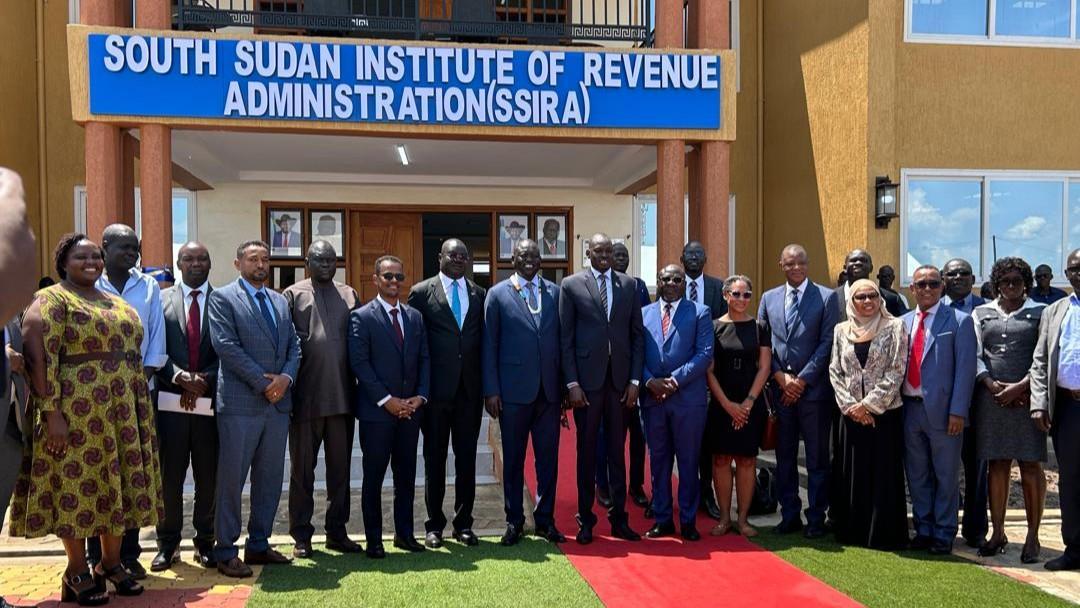Africa-Press – South-Sudan. The Minister of Finance and Planning, Dr. Marial Dongrin, has expressed deep concern over the country’s weak domestic revenue performance, urging urgent reforms to boost tax collection and reduce reliance on oil revenues.
His remarks were made during the inauguration of the newly established South Sudan Institute of Revenue Administration (SSIRA) in Gorom West, Juba County—a World Bank–backed initiative aimed at enhancing tax and customs administration through professional training.
Although the launch of SSIRA marks a significant milestone in capacity building, Mr. Dongrin used the occasion to sound the alarm on the National Revenue Authority’s (NRA) underperformance, warning that its contribution to the country’s Gross Domestic Product (GDP) remains far below expectations.
“The NRA’s contribution to GDP is less than 6%, as envisioned in the first five-year strategic plan,” he stated. “But I know they are on the way probably to achieve [this target] by the end of the fiscal year 2025–2026. And in comparison, 6% of our GDP is huge from less than 2% five years ago. But we are still too far compared to our peers in the region who are doing double-digit.”
South Sudan remains heavily dependent on oil, which accounts for over 90% of its national revenue. Efforts to diversify income sources and strengthen non-oil revenue mobilisation have been lagging, limiting the government’s ability to finance essential public services and reduce fiscal vulnerabilities.
“The average for the East African region is about 13% of tax revenue to GDP. As a country, we must aim to reach that as soon as possible,” Dr. Dongrin added, placing pressure on the NRA to double down on tax reforms.
He described the launch of SSIRA as a turning point in the country’s pursuit of economic resilience, arguing that human capital is critical to building an efficient and accountable tax system.
“This day marks a pivotal point in advancing our national capacity for domestic revenue mobilisation,” he said. “The establishment of SSIRA reflects the government’s strong commitment to building a more resilient and self-sustaining economy.”
“The South Sudan Institute for Revenue Administration is more than just a physical institution; it represents a commitment to professionalising and modernising our revenue systems. We must operationalise the institute and set a new benchmark for excellence in tax and customs administration,” he emphasised.
The institute is expected to serve not only South Sudan but also the wider region, training tax and customs professionals to meet global standards of revenue administration.
Simon Akuei, Commissioner General of the NRA, also acknowledged the challenges the authority faces in mobilising sufficient non-oil revenue to support the national budget. He highlighted SSIRA and the ongoing Non-Oil Revenue Mobilisation Administration (NORMA) reforms as long-term investments in institutional capacity and sustainability.
“The institute and Non-Oil Revenue Mobilisation Administration (NORMA) are national investments in revenue modernisation, diversification, and sustainability,” Akuei said.
“In training our officers, they will have not only the technical competence, but they will also have the leadership and managerial capabilities to manage our tax administration,” he added.
Despite reporting that the NRA had collected 984 billion South Sudanese Pounds by June 2025, Akuei conceded that the amount still falls short of the country’s growing fiscal demands.
“Again, these figures that we are talking about, the 984 billion collected by June 2025, are still very low when it comes to contribution to our national budget,” he said.
Economic analysts argue that boosting domestic revenues—particularly through more efficient and transparent tax systems—is key to reducing dependence on volatile oil revenues and external donors. However, without meaningful reforms in enforcement, tax policy, and institutional governance, the country risks remaining stuck below regional averages.
SSIRA’s success, they say, will depend not only on its training programs but also on the political will to implement reforms and address corruption, leakages, and non-compliance within the revenue sector.
For More News And Analysis About South-Sudan Follow Africa-Press






